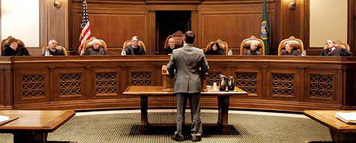GUEST POST: Welcome to Freddie and Fannie’s Mortgage Shell Game, By Shawn T. Newman, J.D.
Did you know that Fannie & Freddie had a policy stating that they didn’t want to receive “notes?” Â I didn’t.
Meet a reader of mine, attorney Shawn T. Newman of Olympia, Washington. Â An exceptional and highly experienced lawyer who fights for the rights of homeowners, among others. Â A professor at both undergrad and graduate levels, and an exceptionally nice person who is both very knowledgable and very easy to talk to. Â Washington State homeowners should know of him, as should the other foreclosure defense attorneys around the country. Â As he says, he’s not terribly well-connected, so I said I’d would certainly help connect him. Â Unquestionably, he’s one of “US.”
As a public sector lawyer, Shawn has worked as a Washington State Assistant Attorney General (Education Division), Evergreen State College Legal Counsel, Washington State Senate Staff Counsel (Senate Committee Services) and as a Public Defender. In his private practice, he represents various individuals, community groups, for profit and non-profit organizations and businesses.
Shawn is currently General Counsel to Saint Martin’s University and has served on the editorial board of the Journal of College and University Law. He is a member of the Washington State Bar Association, Washington State Trial Lawyers Association and the National Association of College and University Attorneys. Mr. Newman also serves as Washington State Director for the Initiative and Referendum Institute, based at the University of Southern California.
Shawn is a graduate of Notre Dame Law School and Ohio State University. While at Notre Dame, he received a fellowship from the White Center for Law and Government and served as the Legislative Research Editor for the Journal of Legislation.
Shawn’s Guest Post follows, but also be sure to look for him in his upcoming Mandelman Matters Podcast. Â And starting today, you can also find his contact information as the latest addition to my Trusted Attorneys tab. Â We need a lot more lawyers like Shawn, but I’m sure glad he’s with us and representing Washington State homeowners.
Mandelman out.
 That’s Shawn appearing before the Washington State Supreme Court
That’s Shawn appearing before the Washington State Supreme Court
Welcome to Freddie and Fannie’s Mortgage Shell Game
By Shawn Timothy Newman, J.D.
Adjunct Professor
Saint Martin’s University
In common parlance, a mortgage (or Deed of Trust) includes the underlying loan (promissory note) and the security on that loan (mortgage or Deed of Trust). This ignores the fact that the note and mortgage (or DOT) are two separate contracts governed by some different laws and legal principals.
As noted in Powell on Real Property, sec. 37.27 [2] (Michael Allan Wolf ed., LexisNexis Matthew Bender 2010)
It must be remembered that the mortgagee has two interests: (1) the debt or obligation which is owned to him, and (2) the security interest in land represented by the mortgage…. In fact, the primary interest is the personalty debt obligation. The interest in land which is available in case security is necessary because of the debtor’s default is considered as collateral interest. Much trouble has been caused by mortgagees attempting to transfer only one of these two interests. Where the mortgagee has “transferred” only the mortgage, the transaction is a nullity and his “assignee,” having received no interest in the underlying debt or obligation, has a worthless piece of paper.
Regarding #1, the debt is the loan contract (i.e. the promissory note). Promissory notes are governed by the Uniform Commercial Code (UCC) Art. 3 (Negotiable Instruments).  The UCC is a uniform law adopted by every state. In addition to promissory notes, negotiable instruments include checks. Like a check, you must negotiate (deliver with proper endorsements) the promissory note to another for that person to claim ownership of the promissory note. Absent proper negotiation of the note, another party cannot claim ownership. So, for example, you find a check made payable to someone else and it is not endorsed to you; you cannot cash it because you are not the owner.
Regarding #2, the security on the debt (i.e. mortgage or deed of trust), is a contractual interest in land with the home buyer designated as the mortgagor and the lender/creditor as the mortgagee. Because a mortgage/DOT is an interest in land, the Statute of Frauds requires such contracts to be in writing and signed to be enforceable. Any assignment of a mortgage or deed of trust must be in writing and signed to be enforceable. Agreements that violate the Statute of Frauds are void and unenforceable as contracts. There are some exceptions to the Statue of Fraud’s writing requirement including an admission in court and under oath “by the party to be charged” that there is a contract (this can be done via discovery). So, as is the case with most mortgages, they are sold by the originating bank (or mortgage company) to either Freddie Mac or Fannie Mae. This is known as the “secondary mortgage market” (secondary, since Freddy and Fannie don’t originate the loans but buy them up from the banks and mortgage companies that do). According to Freddie Mac’s website:
Every day, Freddie Mac provides a continuous flow of funds to mortgage lenders. We do so not by making individual mortgage loans to consumers; instead, we support the U.S. home mortgage market by providing money directly to lenders, ensuring that the system is liquid, stable and affordable. To fulfill this vital mission, Freddie Mac buys residential mortgages and mortgage-related securities and guarantees mortgages made by lenders. We issue debt securities to the global capital markets to fund the purchase of mortgages and mortgage-related securities we hold as an investor. We also create and sell mortgage-related securities to the capital markets, providing a guarantee to investors on those securities.
Freddie Mac pools the mortgages it purchases from lenders across the country and packages them into securities that can be sold to investors. These investors include the lenders themselves, pension funds, insurance companies, securities dealers, commercial and central banks, and others. Freddie Mac also is one of the largest investors in mortgage-related securities, purchasing and holding in portfolio a portion of our own securities and those issued by others.
http://www.freddiemac.com/corporate/company_profile/our_business/securities.html
If Freddie or Fannie truly “own” your mortgage, they have “legal title” to the property and are the “real party in interest” to foreclose.
However, this brings me to an issue raised by Professor Dale Whitman in his article, “How Negotiability Has Fouled Up the Secondary Mortgage Market, and What To Do About It,” 37 Pepp. L. Rev 738, 757-758 (2010):
While delivery of the note might seem a simple matter of compliance, experience during the past several years has shown that, probably in countless thousands of cases, promissory notes were never delivered to secondary market investors or securitizers, and, in many cases, cannot presently be located at all. The issue is extremely widespread, and, in many cases, appears to have been the result of a conscious policy on the part of mortgage sellers to retain, rather than transfer, the notes representing the loans they were selling.
This “policy” was created by Freddie and Fannie and clouds who actually has legal title to the property (i.e. mortgagee) and who “owns” the note.
First, as noted above, it is important to understand that a mortgage contract is an interest in land and, as such, must be in writing to be enforceable per the Statute of Frauds (or fall within one of the exceptions such as an admission in court). Any “sale” or assignment to Freddy or Fannie must also be in writing per the Statute of Frauds.  Some states (like Ohio) require such transfers to be recorded. If you are challenging a foreclosure action, the mortgagor (borrower) should ascertain if a servicer (loan originator or its successor) has sold the mortgage to Freddy or Fannie. This can be done on line at either:
https://www.freddiemac.com/corporate/
http://www.fanniemae.com/loanlookup/
Chances are Fannie or Freddie “own your mortgage.” If you are in litigation, you should follow up with targeted discovery requests to the servicer confirming the servicer does not “own” your mortgage. Moreover, you should inquire and demand any records showing Freddie or Fannie assigned the mortgage to the servicer. Servicers will point to Freddie or Fannie servicing guidelines which basically provide that the servicer forecloses in its (the servicer’s) own name. Given a mortgage is an interest in land and the requirement under the statute of frauds that such contracts be in writing, the servicer’s standing to foreclose can be challenged absent some proof that the mortgage was specifically assigned by Freddie or Fannie to the servicer. Legally, Freddie and Fannie must assign back the note to the servicer. In fact, Freddie has a specific form 105 to do so.
See: http://www.allregs.com/tpl/Main.aspx [Sections 66.17 and 66.54].
However, Freddie and Fannie’s guidelines have evolved over time and you may find that there is no such assignment in most cases.   Unless there is a written assignment from the mortgage owner (Freddy or Fannie) to the servicer, the servicer cannot foreclose for the simple reason they are not part of the mortgage contract.  Simply put, only the mortgage owner can foreclose on the mortgage contract. Moreover, if the assignment of the mortgage is invalid or fraudulent, then there is a “cloud on title” which should be identified by title and mortgage insurers.
Second, according to Powell on Real Property section 37.27 (quoted above),
It must be remembered that the mortgagee has two interests: (1) the debt or obligation which is owed to him, and (2) the security interest in land represented by the mortgage …. In fact, the primary interest is the personalty debt obligation. The interest in land which is available in case security is necessary because of the debtor’s default is considered a collateral interest. Much trouble has been caused by mortgagees attempting to transfer only one of these two interests. Where the mortgagee has “transferred” only the mortgage, the transaction is a nullity and his “assignee,” having received no interest in the underlying debt or obligation, has a worthless piece of paper.
Given what Professor Whitman describes as a “conscious policy on the part of mortgage sellers to retain, rather than transfer, the notes representing the loans they were selling,” it would appear that any alleged “sale” of the note or mortgage to Freddy and Fannie is a fraud. By analogy, you cannot cash a check that is not in your possession or that is not made payable to or endorsed to you. Not only is the sale of the note a sham where there is no delivery and/or endorsement of the underlying loan/note to Freddie or Fannie, if their records (per the website) “show that Freddie Mac is the owner of your mortgage”, then the unity of interest (i.e. loan/note and mortgage/security must be transferred together) is destroyed leaving Freddie and Fannie with nothing.[1]
This begs the question: why would Fannie and Freddy have such a policy given the laws governing mortgage contracts and promissory notes? Consider the fact that Freddie and Fannie are Government Sponsored Entities [GSEs] albeit private corporations owned by the major banks. It seems to me that Freddie and Fannie have been hijacked by the major banks and are being used to buy up bad mortgages and then seek a bailout from the taxpayers.[2]
__________________________________________________________________________________________
__________________________________________________________________________________________
###
[1] http://stopforeclosurefraud.com/2011/08/17/complaint-knights-of-columbus-v-bank-of-new-york-mellon-did-not-acquire-residential-mortgage-backed-securities-but-instead-acquired-securities-backed-by-nothing-at-all/?utm_source=feedburner&utm_medium=feed&utm_campaign=Feed%3A+ForeclosureFraudByDinsfla+%28FORECLOSURE+FRAUD+%7C+by+DinSFLA%29
[2] Note: Freddie and Fannie are major stockholders in MERS which has some of the same legal problems regarding delivery and possession of the note. http://www.mersinc.org/about/shareholders.aspx



